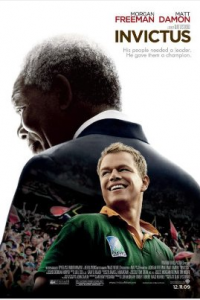 Two questions come to mind when you watch Clint Eastwood’s new feel good movie Invictus. Did rugby really make that big a difference in race relations in South Africa? And just what in the hell are the rules of rugby?
Two questions come to mind when you watch Clint Eastwood’s new feel good movie Invictus. Did rugby really make that big a difference in race relations in South Africa? And just what in the hell are the rules of rugby?
Invictus is a true story (adapted from John Carlin’s book Playing the Enemy: Nelson Mandela and the Game that Made a Nation) set in 1995 S. Africa shortly after Nelson Mandela was elected President. Racial relations were still very strained and Mandela in his infinite wisdom saw a way to diffuse some of the tension by uniting the country behind of all things rugby. S. Africa had been chosen to host the Rugby World Cup, but was not considered to be in the running for any of the top spots. And the blacks were all against the national team called the Springboks since they saw it as the apartheid team. So Mandela went to the captain of the team, Francois Pienaar, and not only inspired him to greatness on the field, but brought the whole nation together behind the underdog team.
Morgan Freeman is a pitch perfect Mandela. To portray a living hero must be the hardest thing an actor can do, but his Mandela is a very grounded character. Matt Damon’s Pienaar is less well drawn. He is thoughtful and clearly sees that he is working towards something great, but you never get a glimpse of what he is about. And if there is a fault in the film it is just that. It is so keenly focused on the game as racial fix, that the people who are involved are only given surface description. Mandela’s black bodyguards are forced to work with the former president’s white unit. At first there is tension, but they all bond by the end. And we see these sorts of thaws all over the place. The black cook and her boss, a policeman and a little black boy, everyone is friends at the end. Perhaps it is a little too simple, but the message is an uplifting one and you do feel good at the end.
I think Invictus is suitable for the whole family. Roosters will love the knockdown drag-out of the rugby, and the message will have everyone leaving the theater in a warm mood. I definitely recommend this one.
And I seriously suggest taking a quick look at the rules of rugby before you go, just so you might have a bit of a clue to the sport during the many rugby scenes.
Oh, and the title Invictus is the name of a poem by William Ernest Henley that Mandela read in prison which inspired and kept him going in the hardest of times.
Out of the night that covers me,
Black as the Pit from pole to pole,
I thank whatever gods may be
For my unconquerable soul.
In the fell clutch of circumstance
I have not winced nor cried aloud.
Under the bludgeonings of chance
My head is bloody, but unbowed.
Beyond this place of wrath and tears
Looms but the Horror of the shade,
And yet the menace of the years
Finds, and shall find, me unafraid.
It matters not how strait the gate,
How charged with punishments the scroll.
I am the master of my fate:
I am the captain of my soul.

I generally agree with Arty Chick’s review. It’s a fine movie that elicits the sense of spirit and pride that Americans felt when the U.S. hockey team beat the Soviet Union in the 1980 Olympics. “Invictus” is “Miracle on the Rugby Field” with a high-brow title. Unfortunately, rugby is much harder than hockey for us average American folk to grasp, so you lose a bit of the tension that rugby aficionados are more likely to feel and appreciate watching this film. The performances are excellent, but the character development is lacking. I saw this movie with my 13-year-old nephew who had recently seen “The Blind Side”, another inspirational sports movie based on a true story. I think we both agreed that while “Invictus” may be the stronger film from an artistic stand-point, “The Blind Side” was more entertaining – mostly because of the character development and the fact that we know a lot more about football than rugby.